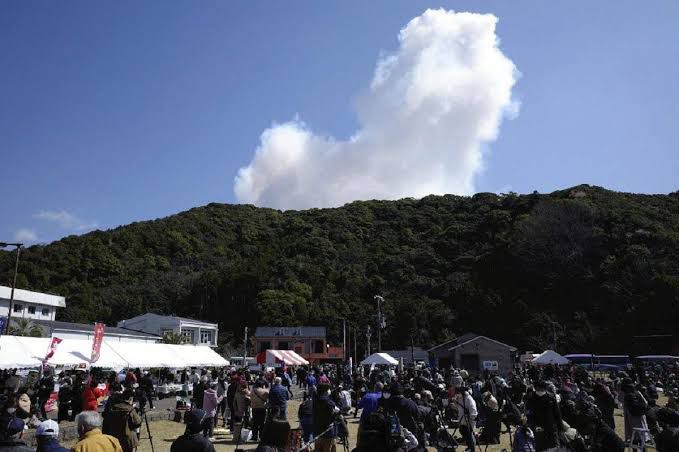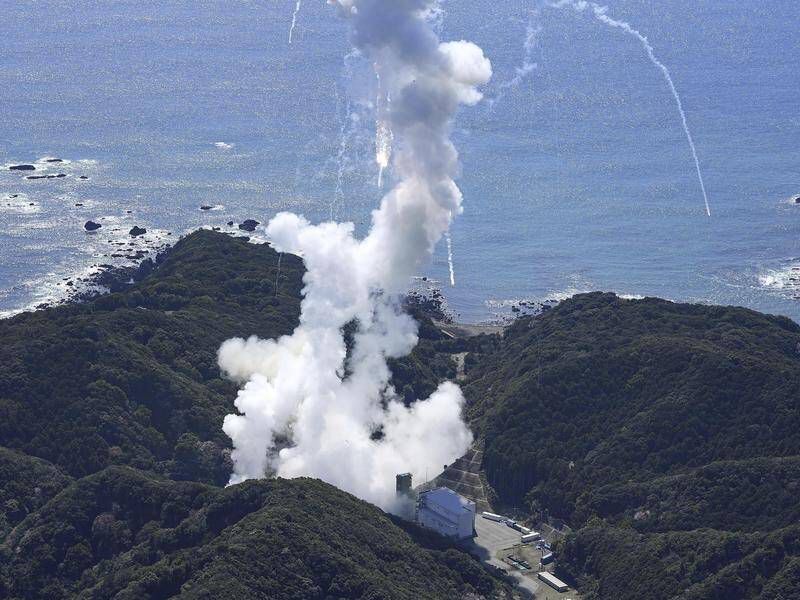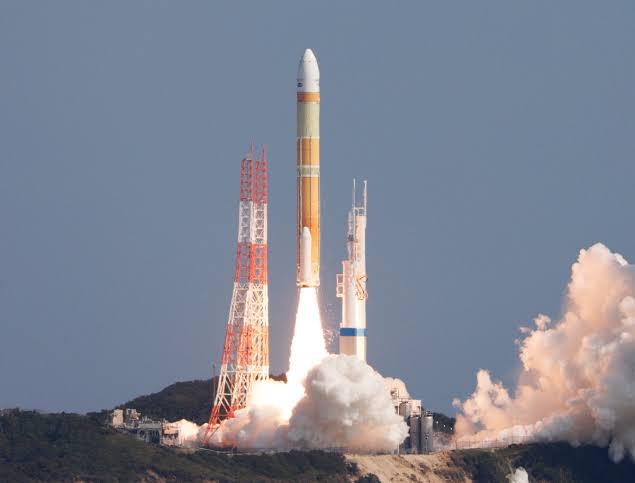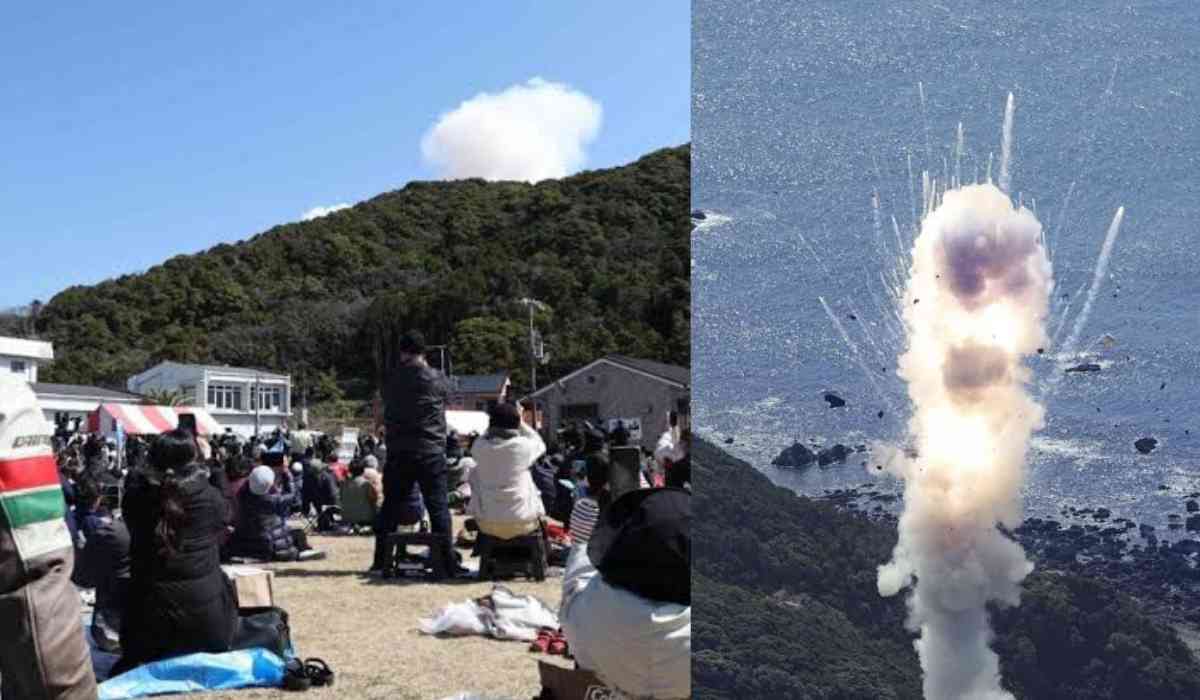The Tokyo-based startup Space One experienced a setback on Wednesday when its satellite-carrying Kairos rocket ‘exploded’ soon after takeoff. Japan's hopes of accomplishing its first satellite deployment success in the private sector were shattered by this setback.
Moments after takeoff, the 18-meter (60-foot), four-stage solid-fuel rocket known as Kairos burst, causing flames and towering clouds of smoke to appear on livestream screens at 11:01 am (02:01 GMT) on Tuesday. The 23-ton rocket's debris fell onto neighboring mountain slopes, setting off sprinklers that shot water.
Launched from a brand-new space facility in Kushimoto, Wakayama Prefecture, the Kairos rocket carried a dummy version of a satellite spying for the government.A rocket named Kairos was shot off from Wakayama Prefecture in central Japan, which is known for its mountains and dense vegetation. Five seconds after takeoff, the rocket burst in midair, as seen in a livestreamed video. Following the detonation, a thick cloud of smoke engulfed the area and flames shot out in different directions.
On NHK's live broadcast, images of burned remains scattered over the terrain were shown after debris began to fall from the sky. Heard on NHK's broadcast, an announcer cautioned the onlookers to stay well away from the launch site. There was an ongoing investigation into what caused the incident. The video showed intermittent streams of water trying to put out the fire. During live news coverage, fragments of the rocket scattered on the ground while firefighters worked to extinguish a significant blaze.
Japan’s first private rocket launch explodes shortly after take-off from the mountainous Wakayama Prefecture in central Japan.
Kairos🚀🔥pic.twitter.com/RPKjqAg3I9 #Kairos #Japan #Rockets
A rocket touted as Japan’s first from the private sector to go into orbit exploded shortly…— Sri Lanka Tweet 🇱🇰 (@SriLankaTweet) March 13, 2024
Fortunately, No injuries were reported, and the fire department in Kushimoto city, Wakayama, confirmed that they had contained the fire.
Space One responds
Space One stated that the exact issue identified by the rocket’s automated system remained unclear and was still being investigated.
The launch had already experienced several delays; Japanese media reported that the most recent one happened on Saturday as a result of a ship being in adjacent waters off the southern tip of the Kii Peninsula.
After taking off from the rugged Kii Peninsula in western Japan, Space One reported that the flight had "interrupted.”
Executives from Space One stated that while they are looking into what caused the explosion, they are still committed to the startup's objective of completing 20 liftoffs annually by the end of 2029 and 30 liftoffs by the 2030s.

Speaking at a press conference in Nachi, Wakayama Prefecture, Space One President Masakazu Toyoda said, "We will find out the cause as soon as possible and clarify our measures to prevent a recurrence."
“Through such steps, we will resume our launches, aim to realize small rocket launch services and contribute to the further expansion of space services.”
“We are taking what happened in a positive way and remain prepared to take up the next challenge,” President Masakazu Toyoda told reporters.
Space One has said the launch was highly automated and required only about a dozen staff at the ground control centre.
Why it is a major setback for Japan?
The rocket was intended to deploy a government-made satellite into Earth's orbit to gather diverse information, including monitoring potential threats from rocket launches by neighboring North Korea. However, a key objective was for Japan to bridge the gap in rocket launch capabilities compared to the United States and China. The launch experienced several delays as a result.
About Space One
Due to difficulties caused by the COVID-19 pandemic and Russia's invasion of Ukraine, Space One, a Tokyo-based startup, had to postpone its first rocket launch five times. The first launch was scheduled for the fiscal year 2021.
Space One was founded in July 2018 as an all-Japanese consortium with financial support from Canon Electronics, IHI Aerospace, and general contractor Shimizu, among others. The company wants to make it easier for the private sector to take over satellite launch services in Japan from the government.

Tokyo-based Space One, received investments from prominent Japanese corporations such as Canon Electronics, IHI, Shimizu, and major banks.
The firm has said it hopes to offer a “space parcel delivery” service, catering to rising demands among international and private-sector businesses to send small satellites into orbit quickly and more frequently.
Japan Space Exploration
The government of Japan has traditionally been in charge of the country's main space exploration projects through institutions like NASDA (The National Space Development Agency of Japan), which is comparable to NASA in the United States.
Following the failure of its first model nearly a year ago, the Japan Aerospace Exploration Agency's next-generation H3 rocket was successfully launched last month, giving the country's aspirations for satellite launches and space exploration a much-needed boost.

NASDA has created a number of rockets, assisted lunar missions, and taken samples from asteroids for scientific analysis. The organization is currently called the Japan Aerospace Exploration Agency, or JAXA. Japan is still at the forefront of space exploration with JAXA.
Japan’s companies are aiming to become a larger part of the growing global space business, as exemplified by ventures abroad like Elon Musk’s Space X.
Japan's first privately built rocket was launched into space by Hokkaido, Japan-based Interstellar Technologies in May 2019, but it did not carry a satellite payload.
Space One would have become the first private company to launch a rocket into orbit if it had been successful.
©️ Copyright 2024. All Rights Reserved Powered by Vygr Media.
























